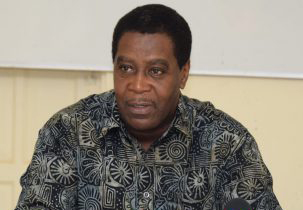Amending the mining legislation to reduce “excessive” ministerial discretion and remove ambiguities is among the recommendations in the draft 10-year mining sector policy.
The Draft National Mineral Sector Policy Framework and Plan 2019-2029 was recently made public and stakeholder consultations are now underway on the document.
In its recommendations, it states that to the extent that predictability and certainty in a country’s mining legislation are factors in investment decisions and international ranking assessments, Guyana should accordingly update its legislation.
Such an update may also be necessary under the EITI (Extractive Industries Transparency Initiative) regime to close opportunities for corruption by removing “arbitrariness, uncertainty and non-transparency” in the local laws, the plan states.
It provides strategic goals for the sector but notes that their realisation requires legislation characterised by clear-cut rules and statutes with predetermined interpretation. It says that currently there are loopholes and uncertainties in the existing mining legislation and that the enactment of proposed changes to the Mining Act and regulations have been stalled.
“Legislative tightening could be achieved through amending the mining act itself or through specifications in the regulations. The focus here is not on the merits of the statutes but on the appropriateness of the text,” it says.
Pointing to discretionary powers of the Natural Resources Minister and the Guyana Geology and Mines Commission as provided for in the Mining Act, the draft plan notes that the term “with the approval of the Minister” appears some 30 times. “Whether or not these references are sometimes merely symbolic, how he exercises his discretion should be clarified,” it recommends.
And where “special circumstances” are used as it relates to the Commission, the draft policy suggests that lawmakers state exactly what is meant. It took a similar position in relation to instances where the Act refers to when the Commission “thinks fit” or is not “satisfied.” “The circumstances under which the Minister by order may exempt any person or class or persons from any provision of the Act should be spelt out as far as possible,” it further notes.
Poor governance
Meanwhile, the draft plan also states that overall governance of the sector requires a clear and shared vision of the future from leaders that must be followed by “a relentless search for and the eradication of inefficiencies, gaps and inadequacies.”
It points out that from the perspective of mining practitioners, other sector stakeholders and the general public, the sector is plagued by myriad shortcomings and those stem from the poor governance of the industry by government agencies. It states, “Whether based on reality or perception, complaints have [included] unfair and unequal treatment of miners; opaque decision-making, slow and unprofessional administrative processes; poor access to, and lack of information; and corruption.”
But the plan notes that given “a steadfast commitment” by government agencies, optimising governance of the industry is achievable and could be realised through short and medium term goals. Towards this end, it suggests that GGMC staff be trained on the requirements, principles and procedures to be applied for mineral sector governance as required by the mining policy; that the EITI be implemented fully and compliance with the Anti-Money Laundering Countering the Financing of Terrorism legislation.
The policy points out that no training occurs for GGMC staff in the area and that citizens have little access to information on the industry.
Freedom of Information practices (FoI) within the GGMC and the ministry is also recommended as the plan states that while this country has FoI legislation, public use has been minimal. That legislation allows state entities to set up their own stand-alone FoI systems and procedures.
The creation of an independent Inspectorate General for the GGMC was also recommended since currently there is no independent oversight of the operations of the GGMC. The plan suggests that the oversight body be given the financial means and independence to fulfill its mandate.
And while more interactions between the agencies and the public are strongly recommended to ensure ongoing feedback, it is noted that when consultations are held with the public, there is a “haphazard nature of follow-through” actions by government. As a result, there should be a written consultation protocol which provides more predictability, consistency and stability, the plan also suggests.
Upgrading both the MNR and GGMC websites is also recommended since the plan states that they are “content poor and rarely updated.” A highlighted deficiency was that both websites provide “little-user-friendly information on the role of the minerals and the mining industry in modern society.”
A stakeholder engagement on the policy was hosted last week Monday at Cara Lodge, in Georgetown.
The Department of Public Information (DPI) reported Sherwood Lowe, who led the team that designed the plan, as saying that the consultations will run until mid-November. He expressed hope that by then “a final document that everyone is comfortable with” is produced, DPI added.
“It’s a discussion paper and we emphasise on that. Nothing here is cast in stone and therefore based on the feedback and the discussions, the document will be modified,” Lowe was quoted as saying.
Representatives of organisations such as the Environmental Protection Agency, Guyana Lands and Surveys Commission, Ministry of Finance, the Green State Development Secretariat and the Guyana Women Miners Organisation were present at the consultation.
The policy is available on the Ministry of Natural Resources’ website at: https://www.nre.gov.gy/2018/10/03/green-paper-national-mineral-sector-policy-framework-and-actions-2019-2029/










